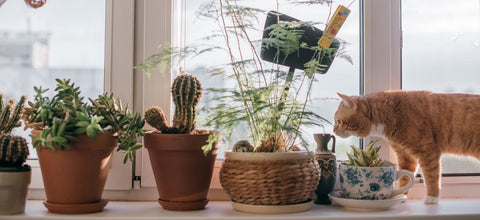

When you love your cats, you will want the best health for the animals, including avoiding chronic or intermittent sinus issues. Some cats have sinus problems because the animals live in human environments that have a variety of pollutants. Here are some of the conditions that can affect a cat along with natural or traditional remedies to help your pet feel better.
Sinus Infections and Inflammation in Cats: An Overview
Sinus inflammation in cats, also known as feline sinusitis, is a condition where the lining of the sinuses, which are air-filled spaces in the skull located behind the forehead, eyes, and cheeks, becomes inflamed or swollen. It's also a common cause your cat's nose looks swollen.
This inflammation can result from various causes, such as bacterial or viral infections, allergies, dental disease, or even tumors. It can be acute (short-lived) or chronic (long-lasting).
Common Causes of Sinus Inflammation in Cats
1. An Infectious Cold in Cats
Cats can develop colds in the same way as humans, and this condition is caused by a virus or bacteria. A cat will display the same types of symptoms that cats have when they have a cold, including:
Symptoms
- Pus around the eyes
- Sneezing
- Dehydration
- Fever
- Loss of appetite
- Lethargy
- Coughing
- Excessive swallowing
- Respiratory difficulties
- Nasal discharge
A cat can have a cold as long as four weeks, but the symptoms typically subside after 10 days. If your cat is having severe fatigue, fever or respiratory distress, then immediate treatment at a veterinarian's office is recommended so that she can prescribe antibiotics.
However, you can usually help your cat at home with traditional or home remedies that include:
Natural Remedies
- Use a vaporizer or humidifier in your home
- Keep your cat warm
- Use a soft cloth to remove nasal or eye discharge
- Provide soft and warm foods
- Offer your cat plenty of water
- Bring your cat into a steamy bathroom
- Give your cat special vitamins
- Pour a small amount of apple cider vinegar in a cat's water bowl
2. Chronic or Seasonal Allergies in Cats
It is also possible for cats to have seasonal or chronic allergies to an assortment of things such as plant pollen, household dust or cleansers used inside a home. Cats develop several symptoms from allergies such as:
Symptoms of Seasonal Allergies in Cats
- Snoring caused by a swollen throat
- Diarrhea
- Vomiting
- Ear infections and itchy ears
- Itchy skin
- Runny or itchy eyes
- Coughing
- Sneezing
If your cat has fleas or if there are insects inside a home, then your pet might have allergy symptoms caused the insect's excrement or exoskeletons. Make sure to get rid of the pests inside a home by vacuuming it frequently along with removing any clutter that attracts the vermin.
You may need to wash your pet with a special shampoo to get rid of any fleas, and also, talk to your veterinarian about long-term treatment to prevent flea contamination. When your cat is allergic to certain types of pet food, you should change to a different brand to prevent nausea, vomiting and diarrhea.
If there are airborne contaminants in your home, then make sure to change a furnace's filter frequently along with using an air purification machine.
Natural Remedies for Allergies in Cats
Here a few additional ways to help with your cat's allergy symptoms:
- Rub moisturizers or antiseptic liquids on your cat's skin
- Clean your cat's fur with a brush or cloth to remove allergens
- Bathe your cat in water that contains finely-ground oatmeal
- Give your cat an edible oil supplement such as omega-3 fatty acid
- Provide a different daily diet and treats for your cat
- Use hypoallergenic food and water bowls
- Provide a cat bed made from organic fabrics
Talk to your cat's veterinarian about immunotherapy shots that can improve your pet's immune system to prevent allergy symptoms.
3. Chronic Rhinitis in Cats
Your cat can have chronic rhinitis that is caused by a serious inflammation of the nose, and this condition is often caused by a virus or allergy. Rhinitis is more difficult to treat than a cold, and it can last for months when you don't use home or traditional remedies.
Here Are Some of The Symptoms of Rhinitis
- Stuffy nose on one or both sides
- Mucus dripping from your cat's nose
- Loss of appetite due to a lack of a sense of smell
- Changes in the shape of the nose or face
- Cat Won't Stop Sneezing
- Respiratory difficulties
A cat that has had a cold may develop rhinitis, or it might have rhinitis without having a cold. The difference between rhinitis and a cold are that the symptoms inside the nose last much longer. Overcoming rhinitis requires a lot of time, but you can use these:
Treatment for Rhinitis in Cats
- Relieve your cat's stuffy nose with oral medication
- Use saline nasal spray in your cat's nose
- Wipe nasal discharge from your cat's nose with a damp washcloth
- Apply petroleum jelly to the tip of your cat's dry nose
- Have a humidifier near your cat's sleeping location
- Place your cat in a hot bathroom after your shower
- Give your cat pet vitamins like our Feline Sinus Support to boost its immune system
- Keep your home clean to eliminate airborne irritants
4. Long-term Sinusitis in Cats
Sinusitis may begin as a cold or rhinitis, but it is a severe inflammation in the sinus cavities of a cat's head. This condition is painful for your cat in the same way that it is uncomfortable for you when you have sinusitis.
There are several symptoms associated with sinusitis in cats, including:
- Loss of energy
- Extreme lethargy
- Irritable behavior
- Nosebleeds
- Discharge from the eyes and nose
- Gagging
- Coughing
- Sneezing
- Lack of appetite
- Loud noises while breathing
- Dehydration
- Swollen and red eyes
- Rubbing the face
When you have a sinus infection, you feel miserable, and your cat will feel the same way. However, you can help your cat feel better by using these home and traditional remedies that are recommended by other cat owners:
- Give your cat sinus and respiratory supplements
- Help your cat to drink water
- Use a syringe to remove mucus from your cat's nose
- Visit a veterinarian to obtain antibiotics for your cat
- Keep your cat warm and comfortable
- Have a humidifier or vaporizer in your cat's sleeping area
- Wash your cat’s bedding to remove irritants
- Massage gently around your cat’s nose and eyes to release mucus
It can take several weeks for your cat to recover from a sinus infection, but you can help your cat feel better faster by providing a nutritious diet and plenty of water.




